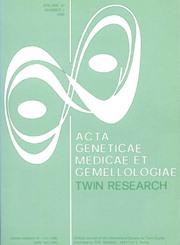Article contents
Is Routine Hospitalization in Twin Pregnancy Necessary? A Follow-up Study
Published online by Cambridge University Press: 01 August 2014
Abstract
During the years 1979-1980, a prospective study was carried out to evaluate the value and efficacy of routine hospital bed rest in the prevention of premature birth and pregnancy complications in twin gestation. This was done by comparing hospital bed rest to special antenatal care at outpatient clinic. Since the results did not support the idea of using routine hospital bed rest, this was abandoned. Because the material was rather small, the results of the changed policy of management were controlled in the present follow-up study. The material consists of 102 twin pregnancies diagnosed during the years 1982-1983. The number of deliveries before the 34th gestational week and of < 1500 g weighing infants were still decreasing (9.0% and 3.0%). Perinatal mortality after the 24th gestational week was 2.0%. The follow-up study confirmed the unefficacy of routine hospital bed rest. Early diagnosis is the basis of the management of twin pregnancy. This allows counselling of the pregnant women, regular examinations to detect pregnancy complications, and also planning of the delivery.
Keywords
- Type
- Research Article
- Information
- Acta geneticae medicae et gemellologiae: twin research , Volume 34 , Issue 3-4 , October 1985 , pp. 189 - 192
- Copyright
- Copyright © The International Society for Twin Studies 1985
References
REFERENCES
- 6
- Cited by


